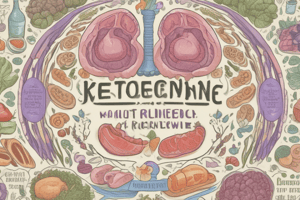Podcast
Questions and Answers
What is a necessary state for the ketogenic diet to have an antiepileptic effect?
What is a necessary state for the ketogenic diet to have an antiepileptic effect?
- A state of nutritional flexibility
- A state of nutritional tolerability
- A state of nutritional ketosis (correct)
- A state of nutritional stability
Who typically manages the ketogenic diet for the treatment of epilepsy?
Who typically manages the ketogenic diet for the treatment of epilepsy?
- A solo doctor
- A solo dietitian
- A team of doctors and dietitians (correct)
- A team of nutritionists and researchers
What is a goal of the emerging variations of the ketogenic diet?
What is a goal of the emerging variations of the ketogenic diet?
- To create more flexibility in the diet (correct)
- To limit the diet to a smaller patient population
- To make the diet more expensive
- To make the diet more restrictive
What is the primary disease that the ketogenic diet has been proven to be effective in treating?
What is the primary disease that the ketogenic diet has been proven to be effective in treating?
What is an important consideration when planning the ketogenic diet?
What is an important consideration when planning the ketogenic diet?
What is a potential direction of research for the ketogenic diet?
What is a potential direction of research for the ketogenic diet?
Study Notes
The Ketogenic Diet (KD)
- The KD has an antiepileptic effect only when patients are in a state of nutritional ketosis.
- Proven effective treatment for drug-resistant childhood epilepsy for decades, but underused globally.
- Research trends focus on exploring the KD's benefits for adult drug-resistant epilepsy, neurological, metabolic, and cancerous disorders.
Characteristics of the Ketogenic Diet
- High-fat, very-low-carbohydrate diet.
- Used since the 1930s for epilepsy treatment.
- Managed by a dietitian and specialist doctor team.
- Requires careful long-term planning, involving nutrient-fortified foods and sometimes a ketogenic formula or combined nutritional approach.
KD Variations and Future Directions
- Emerging variations aim to increase flexibility and accessibility for a broader patient population.
- Ongoing research seeks to improve tolerability and acceptance, identify alternative dietetic forms, and develop shorter-term nutritional treatments that mimic the KD's efficacy.
Studying That Suits You
Use AI to generate personalized quizzes and flashcards to suit your learning preferences.
Description
Explore the characteristics and benefits of the ketogenic diet, a high-fat and low-carbohydrate diet, in treating epilepsy and other disorders. Learn about its antiepileptic effects and research trends.




